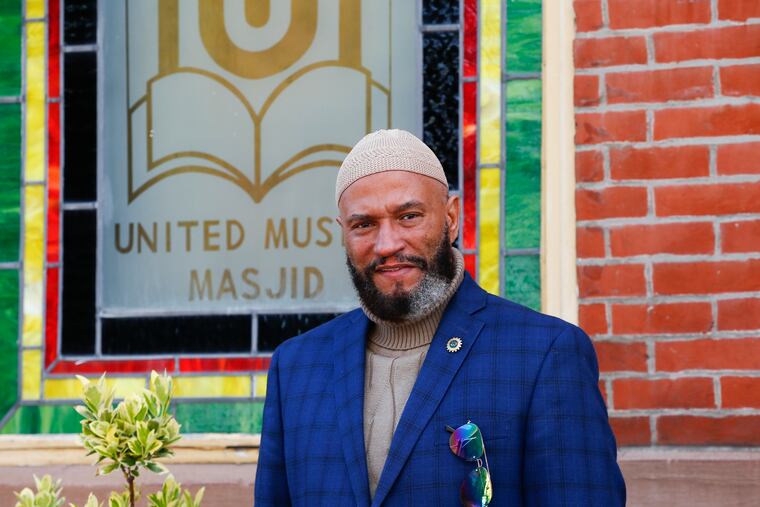Philadelphia-area Muslims must adjust to Ramadan amid a pandemic
Most mosques will be closed — but not all. At United Muslim Masjid in South Philadelphia, Qasim Rashad, the amir, said he plans to have 10 to 20 people there for nightly prayers during Ramadan.

Like Passover and Easter, the Muslim holy month of Ramadan will be fundamentally affected by the coronavirus, as the devout will be forced to accept shuttered mosques, virtual sermons from socially distanced imams, and canceled communal feasts during this pandemic spring.
But when the holiday begins Thursday, one rigorous aspect of the faith will remain intact: fasting for 30 straight days, from dawn till sundown.
“That makes it a monthlong marathon for Muslims,” said Ahmet Selim Tekelioglu, education and outreach director for the Philadelphia chapter of the Council on American Islamic Relations (CAIR). “It’s a challenging time of year, but one of the most rewarding.”
Tekelioglu hastened to add that, this year, all of the faithful are wondering what the holiday will look like. “Community members are concerned," he said. “I know it will be drastically different.”
Prayer and reflection
By CAIR estimates, 200,000 Muslims live in Philadelphia and its surrounding counties. New Jersey is home to between 300,000 and 500,000 Muslims, most of them in the central and northern parts of the state, according to Selaedin Maksut, the state’s executive director of CAIR. He was unable to say how many live in South Jersey, but added that there are significant populations in Atlantic City, Cherry Hill, Voorhees, and Egg Harbor.
They join the 3.5 million Muslims throughout America, and the 1.8 billion worldwide, who mark the occasion when God revealed the Quran to the Prophet Muhammad about 1,400 years ago. The month is for prayer and spiritual reflection, as followers do good deeds and spend time with family and friends.
At the end of 30 days is a three-day holiday, Eid, mostly celebrated on its first day. With the object of the holiday "being you have to see people, visit graveyards of relatives, have lunches and dinner and coffee with as many family and friends as possible,” Eid will feel severely scaled back this year, Maksut said.
“I’m really sad,” said Dana Mohamed, director of community engagement for Iqra Institute, a mosque in West Norriton, Montgomery County. She plans the mosque’s Eid, put on with the cooperation of a Muslim community center, every year in either King of Prussia or Phoenixville. “It usually brings 1,000 people, with games and rides for kids, people selling gifts, and halal food]," she said. "I feel a loss, especially for the children.”
For adults, perhaps the greatest deprivation will be the inability to have nightly meals at mosques and pray there during the 30 days of Ramadan.
“It’ll be a hurt for us,” said Muhammad Khalil, 38, an Atlantic City landscaper who is married with four children. “We’re losing the element of eating and chatting and praying with others. That will be a major disconnect.”
He said he’ll especially miss being with his mother, who lives nearby, and his son Jalil, 19, who lives in Arkansas.
Right now, the plan is to call his son and mother every night of Ramadan after sunset, to break the fast by eating dates and sipping water. “Everybody will be on the phone call to say the prayer before eating the date,” he said.
Not all mosques will close
In the wake of the pandemic, Muslim scholars are debating what form various aspects of Ramadan may take, Tekelioglu said. Some say, for example, that nightly prayers can be offered online. Others disagree, citing differences in interpretation, but say sermons by imams are permissible, he explained.
Most mosques will be closed — but apparently not all.
At United Muslim Masjid, a mosque in South Philadelphia, Qasim Rashad, the amir, or leader, who oversees the religious community there, said he plans to have 10 to 20 people in the mosque for nightly prayers during Ramadan.
“There’s a concept that some faith leaders are being reckless,” he said. “But we want to maintain a connection to our community and our faith. We’ll have a limited number here, and we’ll check people’s temperatures and we’ll sanitize all touch points.”
Normally, Muslims “pray elbow to elbow, foot to foot,” Rashad said. “But we’ll be well-spaced.”
‘Help the less fortunate’
Because low-income Muslims can no longer plan to eat free meals at mosques each night of Ramadan, Abdellah Abdul-Qawi, executive director of Muslims Serve soup kitchen, will be preparing meals to be distributed to 15 mosques, and to individuals’ homes.
“Normally our sites have sit-down meals, but we’ll give grab-and-go food because of COVID-19,” Abdul-Qawi said. He added that his meals are cooked in a kitchen in Bensalem, then he spends a good part of the day on the road delivering food throughout the region.
“I’m trying to be a good Muslim,” he added. “We’re supposed to help the less fortunate.”
‘A Muslim won’t despair’
While many might dwell on what’s lost during the pandemic, “a Muslim won’t despair,” said Imam Amin Muhammad of Masjid Muhammad Mosque in Atlantic City.
“It’s part of belief that God has wisdom in everything he allows to happen,” Muhammad said. In quarantine, “maybe God is telling us to stay within our families, and maybe when it’s all over, we will come out as renewed individuals.”
» FAQ: Your coronavirus questions, answered
Maksut agreed: “If we have to be in isolation, scholars see a benefit in that.
"You have the opportunity to think deeply about your existence and, ultimately, your relationship to God.”